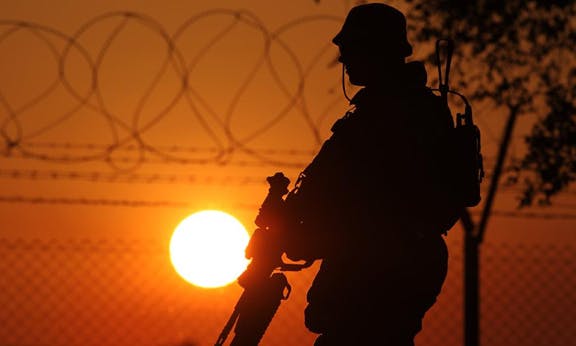Afghanistan: a criminal war

Speaking just over a week after the 11 September 2001 attacks on New York and Washington, US President George W. Bush made his now infamous declaration “either you are with us or you are with the terrorists”. “In this conflict, there is no neutral ground”, he repeated seventeen days later, as military strikes on Afghanistan began.
It certainly felt like this at the time—that there was very little anti-war ground, and insofar as there was any, very few people were standing on it. The Australian government immediately pledged support for the invasion, as did the Labor Party and most union leaders (with a couple of honourable exceptions). The mainstream media dutifully rallied behind it, along with an array of liberals, influenced by the appeal to liberate women from the repressive Taliban. A number of prominent women’s rights groups even held a pro-war press conference at the White House.
The Murdoch press was predictably belligerent, Piers Ackerman writing in the Sunday Telegraph soon after the invasion began, “Some people are running around the country saying they don’t know why Australians are going to war, so let me make a few things clear. Australian military forces are joining a long-overdue fight against evil. Is that too difficult to understand?” Unsurprisingly in the face of all this, almost two-thirds of Australians supported the invasion when it was launched.
In the nearly twenty years that Afghanistan has been occupied by Western soldiers, the reality of this “liberation” has become clear. Since 2009, more than 100,000 civilians have been killed, according to the United Nations Assistance Mission in Afghanistan, and nearly 500,000 were displaced last year alone. According to the US Central Command Combined Air Operations Centre figures, a record 7,423 bombs were dropped on Afghanistan in 2019, up from 7,362 in 2018. More than half the population currently lives in poverty. “Entire cities have been left in ruins, with the United States offering no coherent strategy for a return to stability, or even normalcy, in the places it has been at war”, writes Murtaza Hussein in the Intercept.
For the many Australian champions of this war, this matters not a bit. The purpose of the mission—a show of continuing loyalty to the US empire—has been fulfilled. As Clive Williams, adjunct professor at the Australian Defence Force Academy, wrote in the Sydney Morning Herald last year: “The real reason [for the war] is of course to show we are a willing ANZUS and Western alliance partner in order to be well regarded by the US and receive the defence and intelligence benefits that go with active membership of the Five-Eyes relationship. Afghanistan per se is of little strategic importance to Australia”.
The Brereton report reveals the tragic human consequences of this cold calculation.
The Australian military has long been highly secretive about its overseas operations, especially those of the SAS. A working paper published by the army’s Land Warfare Studies Centre, that looked at the experience of embedding reporters with the Australian forces in Afghanistan, found the Australian Defence Force had an “institutional aversion to media” and a “lingering bias” against media organisations. Partly because of this, “the war in Afghanistan has not only been the nation’s longest military commitment, it has also been the worst-reported and least-understood conflict in Australian history”, argues Kevin Foster, author of Don’t Mention the War: The Australian Defence Force, the Media and the Afghan Conflict.
Journalists who dared to challenge the official narrative have faced extreme repression, from the persecution of Julian Assange for his WikiLeaks revelations to the raids of ABC offices and the referral of ABC journalist Dan Oakes to the Director of Public Prosecutions for his 2017 “Afghan Files” stories.
The Brereton report exposes this for what it is: a monumental cover-up. The reality of Australian troops on the ground is not just that of a pointless war that has further devastated a long-suffering country, but one of barbaric cruelty borne of hardened, racist contempt for those being occupied. Official bleating about how sorry military heads and politicians are for the “misconduct” and “wrongdoing” identified—when they have created a pathologically secretive and sadistic military culture for decades—reveal only that they have been backed into a corner. Certainly, they can never make it up to the countless Afghans whose lives have been devastated by Australian atrocities.
This harrowing report is yet more vindication, if more were needed, of the anti-war position. It vindicates all those who stood against the march to war, who saw through the lies and platitudes and who recognised that, whatever the window dressing, major powers go to war for power and economic dominance, nothing more. Governments and their backers in the media said we were “with the terrorists”. But the Brereton report shows that the Australian government was sponsoring terrorism and the armed forces were carrying it out. Those who launched and continued the invasion and occupation should be in jail for war crimes.